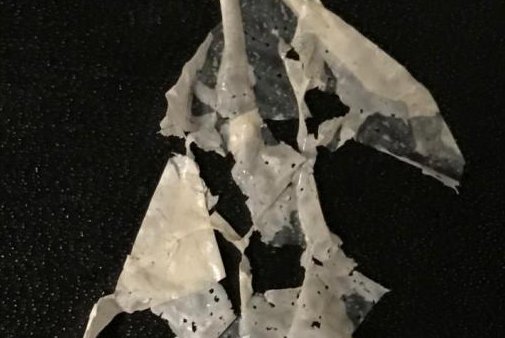Plastic modified by researchers, (L), breaks down after just three days in standard compost, (R), and breaks down entirely after two weeks, suggesting the new substance could be preferable to other plastics that biodegrade partially or not at all. Photo by Christopher DelRe/UC Berkeley
April 21 (UPI) -- Most plastics advertised as "biodegradable" aren't all that degradable. In fact, researchers estimate that most of these supposedly eco-friendly plastics end up in landfills and last just as long as forever plastics.
Scientists at the University of California, Berkeley, have developed a new method for composting biodegradable plastics -- one that actually works.
Most compostable plastics are composed of a kind of polyester called polylactic acid, or PLA. In the lab, researchers deployed a combination of heat and water to degrade PLA plastics in record time.
The composting breakthrough, described Wednesday in the journal Nature, was enabled by the addition of polyester-eating enzymes during the plastic production process.
When exposed to heat and water, the enzymes free themselves from the surrounding polymer chains and begin munching away on PLA molecules. The enzymes turn the PLA into lactic acid, which is consumed by various microbes in the soil.
Other plastic degradation processes yield tiny plastic particles called microplastics. In recent years, surveys have found microplastic pollution in the organs of humans and animals, as well in some of the planet's most remote ecosystems.
The new composting method turns 98 percent of the PLA into simple molecules.
The novel technology, which scientists have recently spun off into a start-up company, is years in the making.
One of the key innovations came in 2018, when researchers developed synthetic molecules called random heteropolymers, or RHPs, used to enwrap the plastic-eating enzymes and prevent them from falling apart during the plastic production process.
For the new study, researchers mixed thousands of these enzyme-enshrining RHPs with the plastic resin beads that jumpstart the plastic production process. Scientists liken the process to the addition of pigments to make colored plastics.
"If you have the enzyme only on the surface of the plastic, it would just etch down very slowly," co-author Ting Xu, professor of materials science and chemical engineering at Berkeley, said in a press release.
"You want it distributed nanoscopically everywhere so that, essentially, each of them just needs to eat away their polymer neighbors, and then the whole material disintegrates," Xu said.
Tests showed the addition of the nanoparticles did not impact the functionality of the plastic. The PLA material could still be melted and reformed into a variety of products, including extruded fibers.
In the lab, scientists degraded PLA fibers using different combinations of heat and water. At room temperature, 80 percent of the fibers degraded within a week. At 122 degrees Fahrenheit, all of the fibers degraded within six days.
Researchers suggest the plastics could be composted at municipal sites or at home.
"It turns out that composting is not enough -- people want to compost in their home without getting their hands dirty, they want to compost in water," Xu said.
"So, that is what we tried to see. We used warm tap water. Just warm it up to the right temperature, then put it in, and we see in a few days it disappears," she said.
Xu and her colleagues said they are now working on developing other types of enzyme nanoparticles than can be used to degrade other kinds of polyester materials.















